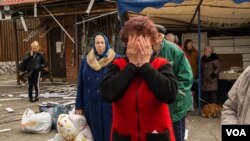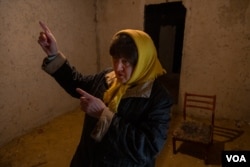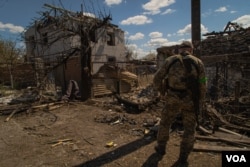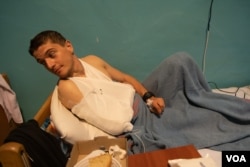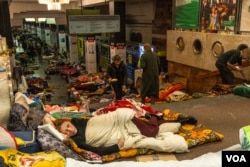In different corners of Ukraine, even now more than three months into the war, many people say they are shocked. They tend to be the older people — those who remember Soviet times — and people in the east, who often speak Russian as their first language.
"We didn't expect this from Russia, our 'brother nation,'" they say.
We have heard this sentiment echoed in Vinnytsya, Kyiv, Kharkiv, Dnipro, Zaporizhzhya, Kramatorsk, Slavyansk and many villages and towns in between.
The shock, they say, of violence at the hands of a "brother nation" adds to the horror of this war, which has killed thousands of civilians and forced millions to flee their homes.
Late last month, at a mostly destroyed roadside rest stop outside Kharkiv, a major eastern Ukrainian city that has been pounded by heavy artillery since the first days of the war, families arrived in buses or cars with white ribbons hanging from the windows — a symbol they hoped would identify them as civilians.
They came from border villages recently re-captured by Ukrainian forces. In the months Russia had occupied the area, many families had opted to move deeper into Russia, which was then the only safe way out of the war zone.
Some at the rest stop said they remained in their villages out of patriotism. Others said they didn't want to leave their animals or farms, or feared life as destitute refugees. Almost everyone appeared visibly traumatized.
A painfully thin man collapsed on the sidewalk. A woman recounted hour upon hour of bombardments the night before. "I thought I was dead," she said several times before sobs overtook her ability to speak.
Border identity
"I was born in Russia," added Valentyna Pavlova, 74, as her friend wept. "But I want to live in Ukraine. It is my country."
The women's village had been relatively safe until recently, she said, also crying and trembling. Most of the heavy artillery had sailed over their homes to attack Ukrainian forces on the outskirts of town, with only a few blows landing nearby.
But when Ukrainian soldiers moved into the village, the war came right to their backyards and no one was safe. "Russians started shooting everywhere," Pavlova said.
As the Russians retreated it struck her as odd that they would hit Ukrainian civilians, most of whom were about the same age as the soldiers' grandparents. "I saw one soldier, a boy with glasses, with bad vision," she explained. "I asked, 'You have bad sight, what are you doing in the army?'"
"I don't know," Pavlova recalled the soldier replying. "I thought I was going to Kyiv to liberate you from Nazis."
'Russia's world'
Among outsiders, many Ukrainians say, there is a commonly misunderstood narrative about their country that, when over-simplified, becomes entirely false. Yet a version of the narrative has long been a part of the national dynamic.
The simplified (and incorrect) version says that Ukrainians who are native Russian speakers support Russia in general, while those who speak Ukrainian as their first language are against it. But as more and more bombs crash into homes, schools and hospitals amid accusations of war crimes and monthslong sieges, every version of this story appears to be falling apart.
In late April, a few hours after a bomb hit a picturesque neighborhood in Zaporizhzhya, a southern city that officials increasingly worry could be within Russian sights for an all-out assault, locals were angry. There was nothing nearby that could be mistaken for a military target, they told us, and most of the region's farmland had already been taken by Russia.
Families in Zaporizhzhya are no strangers to Russian media, and Russian is the common language. For years they heard news telling them that "Russia's world" is friendly, brotherly and worthy of expansion.
But as a dead dog was hauled over a meter-wide crater alongside a dozen shattered homes, Ukrainian men in their 40s and 50s grumbled in Russian. "This is Russia's world?" they said, "We've had enough of Russia's world."
Across town at a military hospital, a wounded soldier from western Ukraine, Nazar Hnativ, 26, said his generation, and his western home city, Lviv, never suffered from disillusion when Russia attacked civilian population centers. He was brought up to reject all things Russian, including the language, culture and people.
Hnativ sees his counterparts — young Russian soldiers — as mercenaries, or underpaid tools of an enemy state.
"If I have to die," he said, lying on a hospital bed, nursing a broken arm and a shattered leg, "it won't be shameful like the Russians, who came here to steal washing machines."
Dead friendships
But even in towns and villages as far west as Lviv, some families are saddened by the re-casting of Russia's role in their personal stories. Besides a long history of aggression, conflict, revolution and sometimes resolution, many Russians and Ukrainians have friends and family on both sides of the border.
But the farther east one travels, the more bitter is the loss. Deep under the ground in a Kharkiv metro station, hundreds have been camped out for months as the neighborhood above suffers near-daily Russian strikes.
Surrounded by fraying mattresses, blankets and make-shift cooking items, many families say they stopped talking to friends and relatives in Russia early in the war, as propaganda narratives diverged wildly between the two countries.
Russian media said Ukraine exaggerated claims of attacks and bombed its own citizens to lay blame on Russia.
"I have relatives in Russia but we don't keep in touch anymore," said Vitaliy Kharchenko, 56, who sold car accessories in Kharkiv before moving underground on February 24, the day the bombing began. "The Russian media brainwashes people."
On February 22, two days before Kharchenko moved underground, another VOA reporter and I visited a Kharkiv park, where residents socialized outside, despite the cold. Over and over, they told us they were confident that if war came to Ukraine, it would mostly pass by the Russian-speaking city with deep social ties to its neighboring country.
"This is Ukraine," Vera Shabatura, 84, told us with confidence, "and I am Ukrainian, not Russian. But my birthday is April 22, the same day as Lenin."




